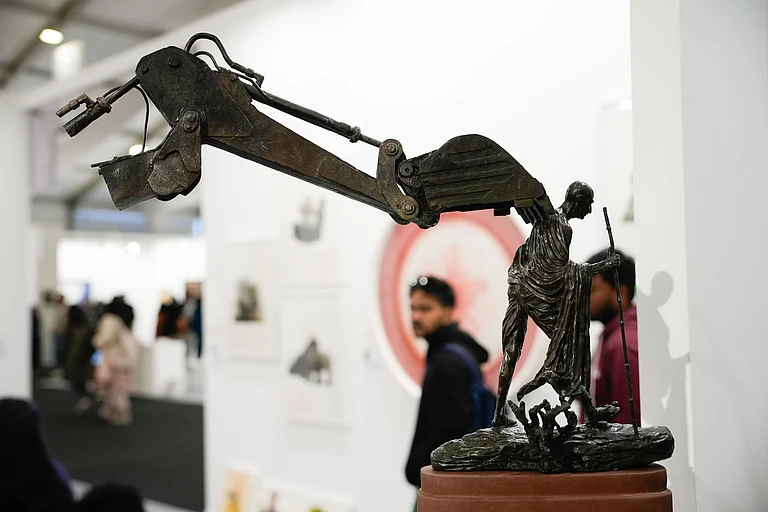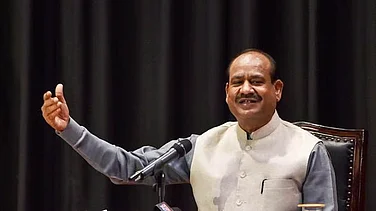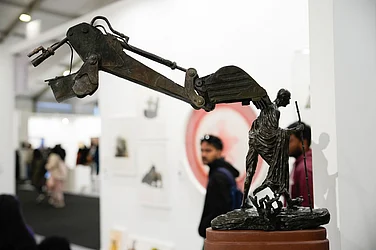Kitaab and hisaab—books and accounts—are the words resonating in Uttar Pradesh’s politics ever since BSP supremo Mayawati threw longtime loyalist Naseemuddin Siddiqui out for “anti-party” activities. Last week, Siddiqui and his son Afzal were sacked, but they exited kicking and screaming rather than fading out. Since then, Siddiqui senior has been drawing great attention to himself and Mayawati by talking incessantly about alleged financial shenanigans within the Bahujan Samaj Party.
In the recent UP assembly elections, the BSP gave 103 tickets to Muslim candidates, but their showing was remarkably poor as the party’s overall tally sank to its lowest ever: 19 seats. Now, as the 1984-founded party appeared to be rethinking that strategy, Siddiqui has presented ‘evidence’ of wrongdoing within the BSP and alleged that there is no room for Muslims in the BSP either.
The evidence Siddiqui presented on the first charge of financial impropriety is, oddly, a series of his own taped conversations with Mayawati. These deal purportedly with payments due to the BSP from several western UP candidates who got tickets in the latest polls. These are referred to as ‘membership’ payments, which are apparently due when these tapes were made. Mayawati says the recordings have been edited to reflect poorly on her—she is apparently heard demanding hisaab or accounts, for the kitaab (membership books) the party gives to all members as a convention.
The conversations offer a juicy tidbit of what has for long been largely rumoured about Mayawati’s party. The go-between for these unpaid dues, it seems clear, is Siddiqui senior himself. But in a twist, he paraded in public those very candidates from western UP this week, and they have supported his claims and strongly denied that they owe any money.
Siddiqui says he is not trying to trap or blackmail Mayawati. “I will make more tapes public only if she makes any further charge against me,” he adds. “If necessary, I will release recordings of calls I got from the BSP’s top leaders in Delhi threatening me after my exit.” His plan of action is to wait a day or two and, if “nothing happens”, hold a meeting with 50-odd ex-members and candidates. Already gaining the hues of a splinter group, the ‘morcha’ will determine whether to join another party or float a new one. “Hundreds are leaving the party every day,” Siddiqui claims. “The party is finished.” He alleges to possess documents relating to Mayawati’s property transactions. “I haven’t given them to anybody. I can—only if she says anything more about me.”
Whatever be the truth, some BSP leaders are taking note of the manner in which the recordings have exposed the party’s inner workings. “Naseemuddin,” according to a former BSP legislator from western UP who remains a party loyalist, “is bringing up so-called threats to his life and apparent danger to himself to wrest a security retinue from the UP government. Why else would he meet the chief minister (Yogi Adityanath)? He will offer to malign behenji in exchange.” Also, “Siddiqui will spread rumours to finish the party”. His allegations bear some truth and some falsehood, this leader says, conceding that “strong public perception about corruption in the BSP” led to his party faring badly in the 2017 assembly elections.
The BJP, going by the recent election outcome, has a strong grasp over the state’s electorate, and many believe elections 2019 will be a watershed for the BSP as well as Mayawati. “The upper castes, backwards and most backward make up around 60 per cent of the electorate. They all strongly back Modi,” says the BSP leader from western UP.

Siddiqui himself may have gained little political mileage, but he has tried to bolster his erstwhile party’s public image as an outfit that condones shady practices. “Law and order and corruption are very big issues in UP now, other than caste and religion,” says this leader. “If the Yogi government takes on crime and corruption successfully, then nothing will shake Modi’s hold over UP in 2019.”
Despite these worrying lines, other BSP leaders point out that there have been many notable exits from BSP. And not just since last year, when prominent OBC leader Swami Prasad Maurya left the party. He is now a minister in the UP government. “My father joined the BSP a full year before Kanshiram formally founded it,” says Afzal. “We would never have left had the party not tried to repeatedly extort from us.” Siddiqui himself became one of Mayawati’s closest confidants in UP’s post-Babri politics and was her second-in-command. Of late, even Afzal was projected as among the party’s prominent Muslim faces.
“Who didn’t have such experiences in the BSP as we did?” Afzal complains. “To meet Mayawati you have to leave your watch, phone, even shoes outside—but nobody stops big bundles of currency notes. The government should, on its own accord, probe this,” he says. Afzal also claims the BSP is, along with the Muslim candidates who lost these polls, losing zonal coordinators and in-charges.

Former Hussainganj legislator Mohd Asif, too, has quit the party along with his longtime associate and friend, Afzal. “It required the release of these tapes for the public to believe what goes on inside the BSP. Now people know.” Asif says it wasn’t out of loyalty towards the Siddiquis that he quit the BSP. “There are two things always being used by the party: one is membership and the other is kitabein (books). Paying for election after election—be it in Bihar, Punjab, Rajasthan—was a sheer and total loss I suffered for five years.”
Siddiqui has spent 34 years in the BSP, his son around five. Yet, they find great fault in the party they ingloriously left, points out a BSP leader. “These are silly and baseless allegations. Mayawati has only asked for party membership money that he was not giving,” he says. “Which party member has the power to keep this money at his home?”
In the 2017 assembly polls, the BSP’s traditional Jatav vote base went up to 23 per cent from 19 per cent in 2014. “These are hard facts. Others come and go, floating voters don’t come to us, Muslims voted for us less than we expected. Nothing has changed—our base is intact, unaffected by all this,” says Sudheendra Bhadoria, Rajya Sabha MP and BSP leader. “Such exits are not new for BSP. People join us thinking of our voter base. If their ambitions aren’t fulfilled they leave.”
Of course, it is much more complex. This time, Muslims of UP voted for the Samajwadi Party in numbers, and for the BSP too, but fewer. However, the Hindus did not rally behind wherever the Muslims went. Here, too, the Siddiquis allege, Mayawati has not shown real interest. “She is not interested in ideology, politics or Muslim-Dalit alliance any longer,” says the senior. “Muslims and Dalits can’t align if she abuses Muslims.”
Rasheed Masood, a longtime Congress leader who joined the BSP this month, says this isn’t so. “There’s a strong chance of this alliance even in the future,” he says. “Muslims have realised that if the BJP has to be defeated, there’s no route but the BSP. Many Hindus have also realised just voting for a Muslim candidate cannot get a ‘secular’ party into power.” As for the corruption charges, he feels, they are too easy to level. “If Siddiqui had proof he would have shown it. Such a person always makes his strongest argument first—he did no such thing.”


























